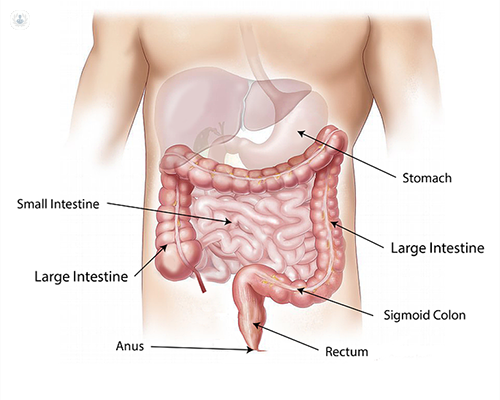Colectomy: An overview of robotic surgical techniques
Written in association with:In this informative article on colectomy, we hear from revered consultant colorectal surgeon Ms Kat Baker on what is involved in the surgical removal of a part or the entirety of the colon (large intestine). The leading expert also sheds light on how advancements in medical technology have introduced robotic surgical techniques into daily practice, revolutionising colectomy procedures. Ms Baker also details the many benefits of robotic surgery and addresses common concerns associated with colectomy procedures.

Why might a colectomy procedure be performed?
Colectomy is performed to treat a range of conditions, including colon cancer, diverticulitis, inflammatory bowel disease, and polyps. The procedure may involve removing a section of the colon (partial colectomy) or the entire colon (total colectomy). In some cases, the rectum may also be removed, which is known as proctocolectomy.
Robotic surgical techniques
Robotic-assisted colectomy is a minimally invasive surgical approach that utilises advanced robotic technology. During the procedure, the surgeon controls robotic arms equipped with surgical instruments, which are inserted through small incisions in the abdomen. The surgeon operates the robotic system from a console, providing enhanced precision and control over the surgical instruments.
What are the benefits of robotic surgery?
Enhanced precision
The robotic system provides the surgeon with a three-dimensional view of the surgical site, allowing for improved accuracy during the procedure. The robotic arms can rotate and manoeuvre with greater dexterity, enabling precise movements.
Minimally invasive approach
Compared to traditional open surgery, robotic-assisted colectomy offers smaller incisions, resulting in reduced scarring, less post-operative pain, and a shorter recovery time. Patients often experience less blood loss during the procedure.
Reduced complications
Robotic surgery has been associated with lower rates of complications, such as infections and wound healing problems, when compared to open surgery. Additionally, the risk of damage to surrounding tissues is minimised due to the increased precision of the robotic system.
Common concerns addressed
Surgeon expertise
Robotic-assisted colectomy requires specialised training for the surgeon to operate the robotic system effectively. Ensure that your surgeon has expertise and experience in performing robotic surgeries and discuss any concerns you may have during your preoperative consultations.
Accessibility
The availability of robotic-assisted colectomy may vary based on the hospital and location. If you are offered a procedure which uses robotic techniques, you should strongly consider it as there are many advantages over open surgery. You should discuss any concerns you have about your procedure with your doctor.
Individual suitability
Not all patients are suitable candidates for robotic-assisted colectomy. Factors such as the complexity of the condition and the patient's overall health may influence the feasibility of robotic surgery. Your surgeon will evaluate your specific case to determine the most appropriate surgical approach for you.
Although it’s important to bear these factors in mind, robotic-assisted colectomy offers various key advantages over traditional open surgery, including enhanced precision, reduced invasiveness, and improved patient outcomes. If you require colectomy surgery, you should discuss robotic surgery with your specialist who can advise if it is a suitable option for your specific case. By staying informed and proactive, you can make well-informed decisions about your healthcare journey.
If you would like to schedule a consultation with Ms Baker, you can do so by visiting her Top Doctors profile.


